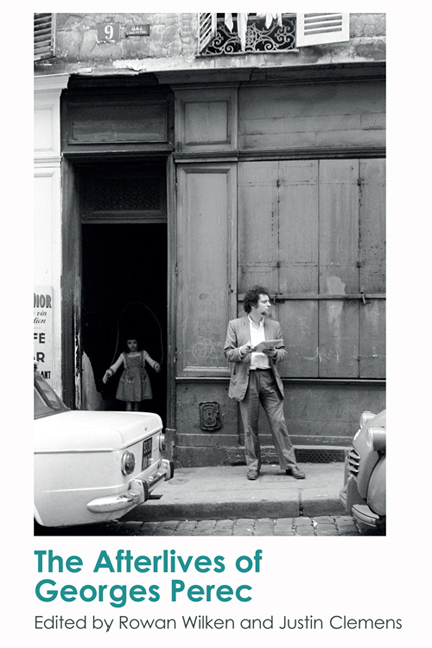Book contents
- Frontmatter
- Contents
- List of Figures
- Acknowledgements
- Notes on Contributors
- 1 Posthumous News: The Afterlives of Georges Perec
- PART I Art of the (Un)realisable
- PART II The Poetics of the Quotidian and Urban Space
- PART III Ludic Intensities and Creative Constraints
- 9 Perec and the Politics of Constraint
- 10 The Architecture of Constraint and Forgetting
- 11 Georges Perec: A Player's Manual
- PART IV Productive Problems of Description and Transcription
- Afterword
- Index
11 - Georges Perec: A Player's Manual
from PART III - Ludic Intensities and Creative Constraints
Published online by Cambridge University Press: 07 December 2017
- Frontmatter
- Contents
- List of Figures
- Acknowledgements
- Notes on Contributors
- 1 Posthumous News: The Afterlives of Georges Perec
- PART I Art of the (Un)realisable
- PART II The Poetics of the Quotidian and Urban Space
- PART III Ludic Intensities and Creative Constraints
- 9 Perec and the Politics of Constraint
- 10 The Architecture of Constraint and Forgetting
- 11 Georges Perec: A Player's Manual
- PART IV Productive Problems of Description and Transcription
- Afterword
- Index
Summary
This chapter explores the well-established attribute of playfulness in Perec's work, a quality exemplified in his 1978 novel, Life A User's Manual. In Perec's oeuvre, Life A User's Manual is the culmination of experimentation with writing through play, games, rules, constraints and contingency. In addition to the many commentators that have noted his interest in play, Perec himself acknowledged that the ludic was one of the techniques of inquiry he used in his writing. The themes and structure of the novel resonate with contemporary discussions of player agency, through the creative use of contingency and constraint in relation to an algorithmic structure, and this attribute of playfulness and experimentation in his work suggests an unintended and enduring afterlife for Perec's work in Game Studies and critical literature on digital games. Perec's work also flags an important and enduring issue for Game Studies: the contentious role that the digitally coded algorithm has in shaping player agency.
No research on Perec can proceed without covering ground opened for exploration by David Bellos's excellent biography, George Perec: A Life in Words. By looking across Perec's oeuvre, Bellos establishes that play and games have an important place in his life and works. By tracing the ground laid by Bellos, this chapter moves in new directions to explore the unusual parallels between Perec's work and the concerns of Game Studies. As Marcel Bénabou notes, it is extremely difficult to make an overarching claim about Perec's oeuvre with any interpretation of his work being ‘only one of the possible “Perecquian Paths”’ that may be taken. To use the metaphor of the humble filing card database of which Perec was a master: by pushing a pin through our stack of cards, we can expose new relations from existing data.
This examination begins by fleshing out the contexts from which Perec's attentiveness to the ludic arose: his childhood and early experiences; his day job as an archivist and database designer; and his experimentation with constrained writing through his association with Oulipo. The chapter then proceeds to examine the writing process he used in Life A User's Manual, and how these processes are emphasised through the themes of the novel, particularly the failed attempts by the novel's protagonist to create an overarching, programmatic vision of life.
- Type
- Chapter
- Information
- The Afterlives of Georges Perec , pp. 189 - 202Publisher: Edinburgh University PressPrint publication year: 2017



